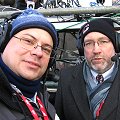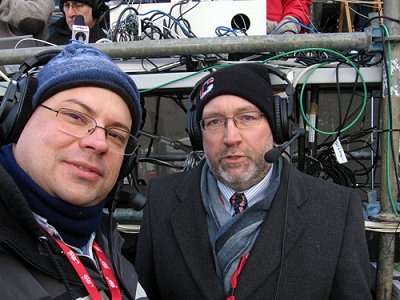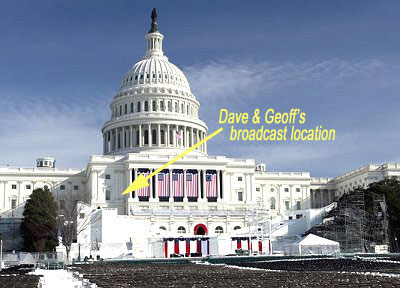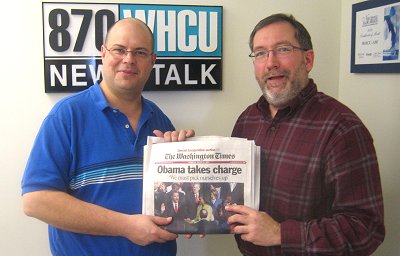- By Dan Veaner
- News
 Print
Print  WHCU's Geoff Dunn and Dave Vieser were Tompkins County's own reporters on the scene when they went to Washington to broadcast live from Barack Obama's inauguration Tuesday. They just about had front row seats in a windy scaffolding set up for the radio press on the left hand side facing the podium. They returned to Ithaca Wednesday in time to broadcast the Morning News Watch program Thursday morning, and then they took some time to talk to the Lansing Star about their experiences.
WHCU's Geoff Dunn and Dave Vieser were Tompkins County's own reporters on the scene when they went to Washington to broadcast live from Barack Obama's inauguration Tuesday. They just about had front row seats in a windy scaffolding set up for the radio press on the left hand side facing the podium. They returned to Ithaca Wednesday in time to broadcast the Morning News Watch program Thursday morning, and then they took some time to talk to the Lansing Star about their experiences.Editor's Note: When I went to the studio to interview them I thought I would end up with a story and a few quotes, but decided to publish our interview in its entirety, because it gives a unique look at what it is like to be a radio journalist as well as insight into what it was like to be right up front at the inauguration itself. Dave and Geoff were enthusiastic about their experience both as professional broadcasters and just as people who got to be a part of a defining moment in history.
Lansing Star: What moved you the most about the experience?
Geoff Dunn: It's got to be the people, the throng of people that were on the Mall and spilling out outside of the Mall. You've seen pictures of these before -- the 'I have a Dream' speech, and the Million Man March and other major events that drew people to Washington... but to witness it first hand really brought all of those photos that you had seen in your history books to life.
It was a remarkable, breathtaking sight to see that many people, and just how well behaved one or two million people can be. Yeah, there was some yelling and pushing trying to get out of the downtown area, but for the most part everybody's attitude was euphoric. It was euphoric, it was festive, there was genuine happiness to be there.
People from all over the country made a lot of friends, I think. People you didn't know.
Dave Vieser: That was definitely number one for me, but right behind it was being able to see every living American President in person, about 50 yards from where we were. From Carter to Bush to Clinton to Bush to Obama. To know that all those people were right there in front of you... it humanized them for me. It made them more human than just being somebody you see on TV. That's certainly a magical moment, because I can always say I have seen so and so in person. It really brought it home to me in a way that no other event that I've covered has.

Dave Vieser (left) and Geoff Dunn broadcasting live from the
United States Capitol Building during Barack Obama's Inauguration
Picture courtesy of WHCU
GD: There were the members of Congress, the incoming Cabinet, all of these people. All you do is put your camera up and zoom in and you get this close-up look at these folks.
This is part of our democracy. This is how our government operates, transisioning from one administration to another. We talk about how peaceful it's been and what a smooth transition it's been, and here it is. This is how it happens and you were witnessing that first hand as opposed to watching it on television or reading about it.
LS: I was seeing on the news in my warm family room (all laugh)... I was seeing journalists being turned away when the crowd got to much for the checkpoints to handle. You had to go way in to get where you were, right? How did you do that?
DV: We went into the belly of the beast, if you would, the Capitol. We literally were that close to the President.
GD: That might have been an issue of people not getting there early enough. We went there early, and we did have our press credentials already on us. Our intent was to be there broadcasting early enough. I think the early bird got the worm in that case.
If you were there much later than seven or eight o'clock you probably got shut out.
That was not our experience. We had a designated area to go to. We had a lot of equipment with us, two bags of equipment.
DV: But in hindsight, if it were to happen again.. I don't think it would... maybe for a female president... Because it was such history nobody expected what happened, which was that at four in the morning everybody came into the city. People who were there just for the ceremony at 11 were already on the train at 4am. We thought they'd be coming in a little after us, that it would just be us journalists on the train at 4am.
Wrong answer! When we pulled up to the train stop at Vienna, Virginia, the interstate was already backed up at least a half mile, just to get off onto the exit. We sat in the truck for an hour and a half longer than we expected to. Right there that put us behind. The train ride was an hour and a half long, double the time it normally takes.
So you had this backup from the beginning. It must have been even worse for those who were trying to get in a few hours later. But for us it was a shock to see that crowd and it was a shock for the people who were running the system, because they didn't expect it either. The overwhelming early arrival made it so that anybody that was coming in a little bit later was shut out. I'm sure that did include journalists.

DV: We were sitting right next to the CBS correspondents that we broadcast every morning in our 'top of the hour' reports. Peter Mayer, Steve Futterman. Bob Fuss was literally next to me. Then we were right next to Toronto's number one news guy who does radio across the nation. While he was there he was picked up on a national broadcasts.
GD: He's sort of like the Brian Williams of Canada's radio news.
LS: This must have been a whole 'nuther thrilling situation, like being at a broadcasters' convention.
GD: Pretty much, in a way. But no movement! Once we were in place we pretty much had to stay there. Once you got into place you locked yourself down for the ceremony.
LS: CBS has a lot of affiliates. that must have been a pretty big area.
GD: This was the radio affiliates who had requested space for their coverage. Below us we had Fox News affiliates. I believe the only other upstate New York station was out of Syracuse, WSYR, which is a Fox News affiliate. They were two rows below us.
DV: They were Clear Channel, which is Fox. Right above us was AP Network News with a guy named John Belmont, who we used to have all the time on WTKO when we were down there. Above that were some international radio reporters. There was an Arab broadcast group two rows below us.
We were lucky. I'm not sure if they turned away other CBS stations, but we only had one row, and we were going to squeeze what we could in there and that was it. We got our request in early -- we may have preempted some other stations from going just by being early.
GD: There was a deadline for your request and as long as you got that in there you were pretty much guaranteed your spot, because you were willing to pay for the lines and equipment you needed.
DV: We were among Atlanta, Toronto, New York City...
GD: Philadelphia, Chicago...
DV: And of course, D.C. So we were among the top ten broadcast places -- there was Ithaca. But you know what? We had the same equipment they do. I understand the broadcast came back here about as clearly as anybody else's. We were really proud of that. It's a really proud moment professionally. And as a person you step out of it and say, 'Wow, I'm here. This is a big event.'
LS: You carried in all the equipment you needed to broadcast?
DV: We carried it in on the train.
LS: Did you hook into something to broadcast back to here?
GD: They had the phone lines.
DV: Just a phone line like you have in your house. We have equipment that digitizes our voices and makes it sound broadcast quality.
LS: I picture you walking with everything on your backs like my Great Grandmother's family when they emigrated to this country. Here are you two guys, and you're not going to be able to go back if you forgot something!
DV: Believe me there was some stress beforehand making sure we had everything we needed and backups of everything. We even ended up helping out the Toronto station. Geoff let them borrow one of our microphones that we didn't need. They were appreciative of that, because you're in a situation where you can't say, 'Oh I'm going to run to the car.'
GD: No, no, no! It's probably ten miles away!
DV: So you cross your fingers and pray that everything works. And after a few minutes of struggling I realized, 'Oh my God, we are on!'
Not only were we able to do that, but we were able to provide scene setters for other companies that this company owns, which includes stations in Bellingham, Washington, Springfield, Illionis, Yankton, and South Dakota.
GD: We did the three, and of course all of the Ithaca stations.
DV: So we were able to provide coverage not just to the WHCU audience, but to others who we are associated with. That was really cool, actually.
LS: I want to ask you each about something you were stressing not in a news way, but in a personal way. Dave first: on the air, before you left you seemed ot be stressing a little bit about how cold it was going to be. How did that work out?
DV: All I can say is thank God I brought a neck warmer! The President didn't have one, and I think his inflection was hurt a little by that. I've never broadcast in cold for that duration of time in my career. So I had all the right gear on, and even then it still came through very cold.
I was walking in place to try to get the blood flowing. It's funny -- when we left it took a minute for your legs to start working right. Your muscles had cramped up. Other people were complaining about that, too, when we were getting off the scaffolding.
LS: So you were up in the wind!
GD: Yeah, the wind was coming right at us.
DV: It was right in your face. My nose was running. I had my ears covered, of course, with my headset. It was a challenge among challenges, because even when you are out reporting in the field you are moving around. Here we were staying still.
The thing that probably saved us from completely freezing was that the sun came out for a while.
GD: The sun came out and also across from us was the tower with the TV area. They had their lights on and I could feel some of the warmth off of the lights. But it wasn't much. You couldn't get rid of any of your layers.
DV: It was also damp, and damp cold is the worst cold.
LS: Geoff, yours was just getting places and finding people. What I'm keying off of is when you ended your interview with Michelle Berry she said, 'Thanks for finding me.' How the heck did you find her?!
GD: Well, we had already made contact, obviously, before leaving Ithaca and making sure that we were going to meet up at a certain spot. Our original plan was to meet in Congressman Hinchey's office. She was the Obama delegate representing the 22nd district, Hinchey's district.
I had my interview set up with (Congressman) Michael Arcuri, and then I was going to meet her at Hinchey's office to do the interview. That all changed when I got up to the Cannon Office Building to see Michael Arcuri and realized that the line was all around the building. Each office building -- Longworth, Cannon, and Rayburn, all had long lines of people who were standing in line to see their congressman or congresswoman to get their passes, because they weren't sending their tickets out by mail.

Back at home, Dave and Geoff in the Morning News Watch studio
At that point I called her and said, 'We're going to have to bag it because you're going to have to stand in line for an hour to get in there.
LS: You had already stood in line for an hour?
GD: After I stupidly stood in line myself for an hour to get in, and then realized I could have just gone up to the guard and said, 'I've got an interview, I'm not here to get tickets.' And they would have let me in. But I didn't know that at the time,because when I called the office the staffers told me we had to stand in line, too.
We just made contact by phone and we actually ended up doing the interview outside Federal Center Southwest Metro Station. They had a few eateries -- there's a Starbucks and a couple of outer spots there. There were some open tables and chairs outside, so we ended up doing the interview there.
LS: You couldn't have done that at the Kennedy inauguration becaue they didn't have cell phones then.
DV: Absolutely! Cell phones made a world of difference. At the very same location where Geoff intervied Michelle Berry on Monday, there we were Tuesday afternoon. The trains had been shut down temporarily, because of the overload of people. They wouldn't let people on the platform because one woman had fallen down on the tracks earlier in the day. So they were being extra cautious.
But that created a mass sea of people trying to go home. They couldn't go home because there were no busses, the roads were closed, and the subways were temporarily closed.
So at that very same intersection we discovered we were stuck in the cold of Washington, D.C. The wind was blowing even more then.
GD: That was after the swearing in.
DV: We ended up meeting with our AAA Travel folks and getting on one of the nice warm tour busses and going to dinner. It was a wonderful event, but it was tricky getting in and out for everybody. For media, for people coming, and I understand even for people in power it was a bit of a trick getting in and out.
LS: I heard a lot of people were sleeping in their offices the night before.
GD: I really felt bad for people who had to work that day. The government was basically shut down that day, but other offices...
DV: I think most of them were shut down. I saw one pretty well known private consulting firm and their offices were shut down.
GD: But your eateries and coffee shops stayed open, and they made a killing!
DV: We ate at a restaurant that was serving crab legs. That place was hopping like you've never seen before. The restaurants and the hotels certainly did a great business down there.
LS: If you had to knock it down to a sound bite to go on the air, what would it be?
GD: I would say, 'Breathtaking, unforgettable'. Seeing history and the democratic process in person -- you studied this for years in school and now to see it unfold before your eyes is just amazing.
I also want to comment about the criticism that the media was just gushing over the whole thing. Remember it was the ceremony. It's something that happens every four years or every eight years on this scale with a new administration. I think that the media coverage was all about the celebratory nature. It wasn't that they were fawning over Barack Obama. They were trying to give their viewers, their listeners, their readers the sense of what it was like.
I don't think we were off base at all in how we described what it was like. It has nothing to do with the incoming administration.
DV: It was also about history being made. No other inauguration in any of our lifetimes has the significance that this did of literally changing American history and putting an exclamation point on the struggles that African Americans have, or for that matter any other minority group in this country. They now can look up and say, 'You don't have to be a white guy to run the country'.
I hate to use a sound bite, but to use a phrase we've used throughout this event: 'Witness to history.' That's really what we became as both journalists and as Americans. And for a good time down there I felt more that I was an American than that I was a journalist.
----
v5i4



